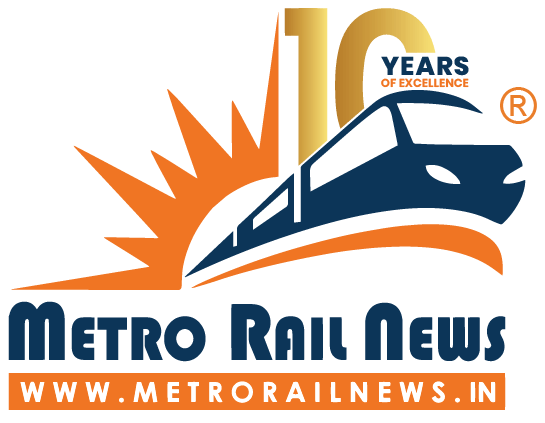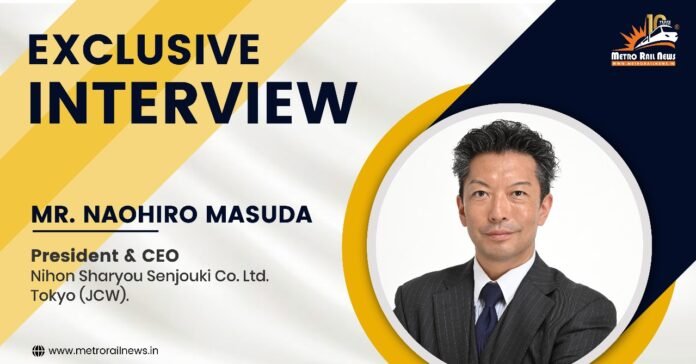Metro Rail News conducted an exclusive interview with Mr Naohiro Masuda, President & CEO, Nihon Sharyou Sejouki Co., Ltd., Tokyo (JCW). During the interview, Mr. Masuda discusses the company’s focus on providing effective cleaning solutions for railway systems across the world. He explains how JCW customises solutions based on different climatic and operational conditions. Mr. Masuda also shares JCW’s involvement in several international projects, including those in Asia. Furthermore, he emphasises JCW’s interest in expanding in India to support its growing rail transport sector. Here are the edited excerpts.
Question 1. Mr. Naohiro Masuda, could you elaborate on your two-decade journey as the President & CEO of Nihon Sharyou Sejouki Co., Ltd. (JCW) and how your leadership has influenced the company’s growth over the years?
We are, at our core, a cleaning company and our focus is on delivering effective cleaning solutions. I have attributed the origins and the goal of bringing up the company. So, our primary goal is to exist for the customers. And we are just aiming to be the best in our sector. And we would like to be the world’s best manufacturer one day.
Question 2. Could you provide insights into the primary products and services JCW offers for the railway industry?
We have a lot of products at hand. There are just too many to explain. A few examples would be car body washing equipment, boggy washing equipment, bearing washing, parts washing, etc. We also have wastewater treatment, recycling equipment, reverse osmosis water production equipment, and many others. To sum it up, we design and manufacture all the equipment that does the cleaning.
Question 3. How has JCW evolved over the years to meet the dynamic demands of modern rail transportation?
We have always challenged ourselves to meet our customers’ needs and demands. We have never said that we cannot do what our customers request. We have also never received a complaint after we have delivered what has been requested of us. We put all the knowledge that we have into our products. We invite specialists to produce something that is lacking in our products. That is why our product today is much better than what it was years ago. We always strive to be better than what we were yesterday.
Question 4. What distinguishes JCW’s railcar cleaning and maintenance systems from others in the global market?
The main thing would be that all of our equipment has a very low failure rate. According to our annual operating hours, it is down to less than 0.3%. We have also experienced very low stoppage rates, and we have been producing cleaning equipment for 70 years. Therefore, 70 years of experience is infused in our products and our machines. In the event of an unexpected breakdown, after receiving information, we have trained our maintenance system to respond to it within 24 hours. It is done for the convenience of our customers.
Question 5. How do your solutions cater to both high-speed and urban rail systems, including metros and commuter trains?
We cater to numerous customers from all over the world, such as Japan Railways, trains and mass rapid transport in Singapore, Hong Kong Subway, and many other Southeast Asian railways. It is a long, long list. We also cater to customers from different fields, such as the military, mining, food manufacturing companies, and many, many others. Different fields require different cleaning equipment. With all the knowledge and experience gained from our experience, it has made us more attuned to solving different systems of transportation and machinery.
Question 6. JCW has been involved in various international railway projects. Could you share a few key collaborations or projects outside Japan?
Recently, almost all major railway projects in Asia have incorporated our products, including the Hong Kong Airport Railway, Jakarta MRT (a mass rapid transit system), Manila Metro, and the Manila North–South Commuter Line.
Question 7. JCW is known for its railcar washing systems. What recent innovations or technologies have you introduced in this domain?
Currently, we are developing unmanned cleaning equipment for the front and rear cars of high-speed trains. This system is being developed and produced in collaboration with one of the most renowned railroad companies in the world; however, we cannot disclose the name due to a non-disclosure agreement (NDA). This is the world’s first unmanned washing system specifically designed for the front and rear sections of high-speed trains. This cleaning equipment will be something that is beyond our imagination, so after extensive testing, including the creation of a one-by-one scale mock-up model vehicle, it will be finished by December 2025 this year.
Question 8. Automation is emerging as a core element in driving smooth operations. How does JCW integrate automation systems to improve efficiency and reduce operational downtime?
Yes, automation is indeed one of our most important systems. Our current machines can operate unattended, but actions are performed for safety checks and operational purposes. However, with our current technology, we can build machines and systems that might not require human intervention one day. In the event of a breakdown in such a machine, the system can automatically inform the engineer, who can then sort it out.
Question 9. Sustainability is a growing concern globally. How is JCW incorporating eco-friendly practices into its manufacturing and service processes?
All of our products are designed and manufactured with sustainability in mind. For our cleaning equipment, we source components from world-renowned brands that also prioritise sustainability, such as Mitsubishi, SMC, Panasonic, Omron, and Sumitomo. These Japanese companies integrate sustainable development goals into their core brand values.
Furthermore, we develop and produce a large number of products in-house. By doing so, we contribute to sustainability as well.
Question 10. Could you shed light upon any specific water-saving or energy-efficient features in your railcar washing systems?
Our cleaning equipment uses water and recycles 100% of it during the cleaning process. Complete cleaning requires a large amount of water, which can be harmful to the environment and result in high operating costs. That is why all of our cleaning equipment uses recycled water only.
Question 11. How do you customise your systems to suit the specific climatic and operational conditions of different countries?
Of course, we customise our systems according to the country and the place. It varies from country to country. The dirt & stains can also vary from country to country even within same country. For instance, the dirt and stains found on train cars in Delhi can be very different from those in Mumbai. These differences are influenced by factors such as humidity, temperature, air pollution, vehicle mileage, and more. Therefore, the cleaning method is adapted based on the location where the equipment is installed, and we tailor our systems accordingly.
Question 12. India’s rail transport sector is expanding with projects in metro rail, RRTS, and high-speed corridors. How does JCW intend to explore potential opportunities in the Indian market?
In India, we aim to incorporate the knowledge and expertise we have gained over the past 70 years in Japan, as well as from our global operations. Thereafter, as an Indian manufacturer of cleaning equipment, we would like to expand further and align our efforts with India’s Make in India policy too.
We already have a subsidiary company in India, and we are currently in the process of inquiring about various cleaning equipment throughout the country. As per our findings, the Indian equipment is not up to the mark by the Japanese standard. They might fit into the look of cleaning equipment, but their functionality and efficiency can be considered a little bit below the standard as per Japanese standards.
For instance, if we install an air conditioner and then if it doesn’t work properly, then it is a problem, right? Rather than seeing this as a business opportunity, we would genuinely love if India makes use of our cleaning devices. So being the oldest manufacturer of cleaning equipment in the world, I feel that India would greatly benefit from our company and our devices. And we also intend to follow the Swachh Bharat policy and respect that.
Question 13. What message would you like to convey to the readers of Metro Rail News?
As we know that India is a developing country and Indian railroads are under development and redevelopment. However, it will soon become the world’s largest railroad powerhouse. The number of lines, the length of distance covered by the tracks, and the number of coaches would soon be the number one in the world. This is only possible with the right number of people and funding, of course.
We are looking into having the best skills and experiences in order to make the Indian railway system the best railroad network in the world. We want to be a company that grows with the growth of the nation as well as the Indian railway system. To do so, we need many teachings of India and the Indian people. We also want to be a company that is loved by India, loved by Indian people and respected by everyone.
Watch full interview Here: https://youtu.be/f2RCN3wAvWA?si=pX0yOTubuJqRfKHq








